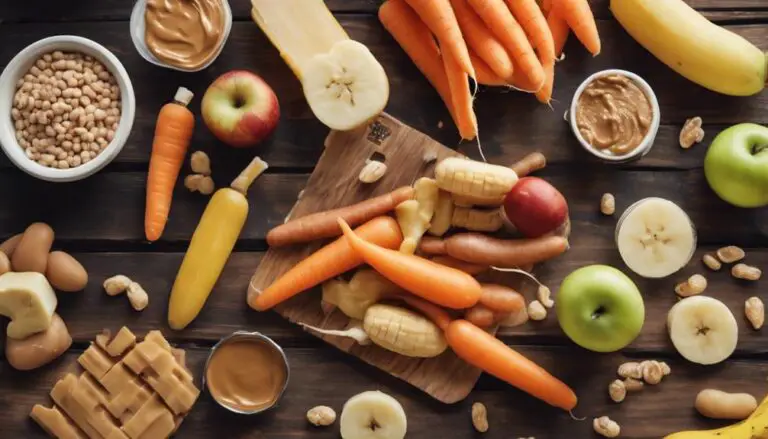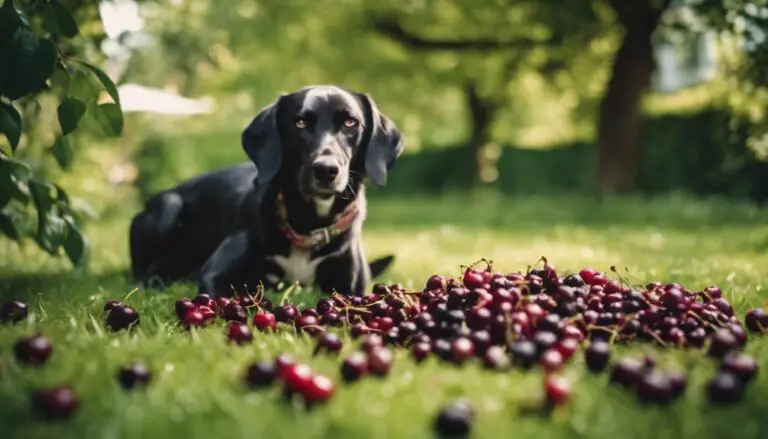How Many Raisins Can a Dog Eat
If you're considering giving your dog raisins, be cautious. Even a few raisins can be harmful, potentially leading to serious health issues like kidney failure. It's important to avoid feeding raisins to your furry friend to prevent any risks associated with toxicity. Remember, your dog's well-being should come first. Stay informed about the dangers of raisins and explore safe treat alternatives to keep your pet healthy and happy. Understanding the potential risks can help you make informed choices when it comes to your dog's diet and overall health.
Key Takeaways
- Even small amounts of raisins can be harmful to dogs.
- Avoid giving raisins to dogs to prevent serious health risks.
- Safe limits vary based on the dog's weight.
- Awareness of the toxic nature of raisins is crucial.
- Opt for safe alternatives like carrots instead of raisins.
Potential Risks of Raisin Consumption
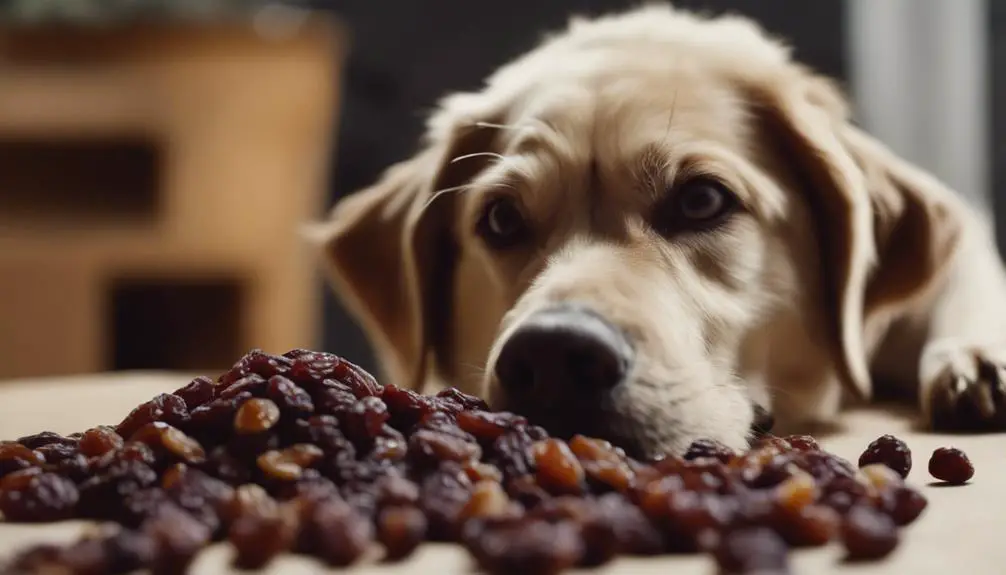
When considering the potential risks of raisin consumption for dogs, it is important to be aware of the serious health implications that can arise. Health risks associated with dogs consuming raisins include kidney failure, vomiting, diarrhea, and lethargy. It is vital to guarantee that your dog avoids ingesting raisins as even a small amount can lead to severe consequences. Monitoring behavior is key; if you suspect your dog has consumed raisins, immediate veterinary attention is necessary. To prevent such risks, focus on safe consumption practices and always keep raisins out of reach. Opt for dietary alternatives that are safe for dogs, such as carrots or apples. Your dog's well-being is paramount, so be diligent in avoiding any exposure to raisins.
Toxicity Levels in Dogs
When it comes to dogs and raisins, it's important to understand the toxicity levels involved. Raisins can be highly toxic to dogs, leading to serious health issues if ingested. Symptoms of raisin poisoning in dogs can range from vomiting and diarrhea to kidney failure.
Raisin Toxicity in Dogs
Raisin toxicity in dogs poses a serious health risk due to the potential harmful effects of consuming even small amounts. It's important to be mindful that raisins can be toxic to dogs, leading to kidney failure and other severe complications. To guarantee your dog's safety, it's best to avoid giving them raisins altogether. Instead of raisins, consider offering safe snacks like carrots, blueberries, or apples as healthy alternatives for your furry friend. These options are not only tasty but also free of the risks associated with raisin consumption. Remember, when it comes to your dog's health, it's always better to be cautious and choose snacks that are known to be safe for them.
Symptoms of Poisoning
To protect your dog's well-being, it's essential to recognize the symptoms of poisoning from raisin toxicity, which can indicate varying levels of danger to your pet's health. If your dog has ingested raisins, watch for symptoms such as vomiting, diarrhea, lethargy, abdominal pain, weakness, and decreased urine production. These signs may appear within the first 24 hours after consumption. In severe cases, dogs might experience tremors, seizures, or even coma. Immediate veterinary care is essential if you notice any of these symptoms. Treatment options may include inducing vomiting, administering activated charcoal, intravenous fluids, and supportive care. Long term effects of raisin toxicity could lead to kidney failure, underscoring the importance of prompt intervention to prevent irreversible damage.
Symptoms of Raisin Poisoning
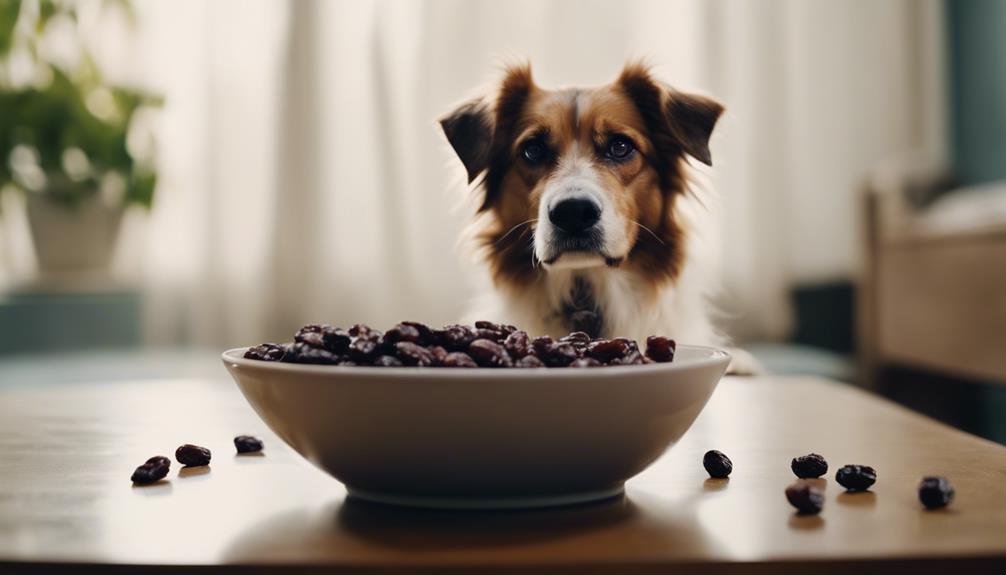
When it comes to raisin poisoning in dogs, it's important to recognize the symptoms early on. Symptoms may include vomiting, diarrhea, lethargy, and decreased appetite. If you suspect your dog has consumed raisins and is displaying any of these signs, seek immediate veterinary attention to prevent any serious complications.
Poisoning Symptoms Overview
If your dog consumes raisins, it's important to be aware of the potential poisoning symptoms they may exhibit. Raisin poisoning can lead to serious health issues, so recognizing the signs early is essential. Here is an overview of symptoms to watch out for:
| Poisoning Symptoms | Description |
|---|---|
| Vomiting | Can be persistent and severe |
| Diarrhea | Often accompanied by dehydration |
| Abdominal Pain | Shows signs of discomfort |
| Lethargy | Unusual tiredness or weakness |
If you notice any of these symptoms after your dog has ingested raisins, seek veterinary help immediately. In the next section, we will discuss the importance of immediate veterinary attention and the steps to take.
Immediate Veterinary Attention
Upon observing any of the aforementioned symptoms in your dog post-raisin ingestion, immediate veterinary intervention is essential to safeguard your pet's well-being. Raisin poisoning can lead to severe complications, so swift action is vital. Inform the veterinarian about the quantity of raisins consumed and when it happened. Follow dietary restrictions recommended by the vet, which may involve withholding food. Emergency protocols often include inducing vomiting or administering activated charcoal to limit toxin absorption. Your vet may also recommend intravenous fluids to help flush out toxins and support kidney function. Monitoring your dog closely during this time is imperative. Remember, never attempt home remedies without professional guidance, as they could worsen the situation.
Safe Limits for Dogs
How many raisins can your dog safely consume? When it comes to dogs and raisins, it's important to be aware of the potential risks. Even small amounts of raisins can be harmful to dogs due to their toxic nature. It's best to avoid giving your dog raisins altogether to prevent any negative effects on their health. Below is a table outlining safe limits for dogs when it comes to raisins:
| Weight of Dog (lbs) | Safe Raisin Amount (raisins) |
|---|---|
| 10 | 0.1 |
| 20 | 0.2 |
| 30 | 0.3 |
| 40 | 0.4 |
| 50 | 0.5 |
Treatment for Raisin Ingestion
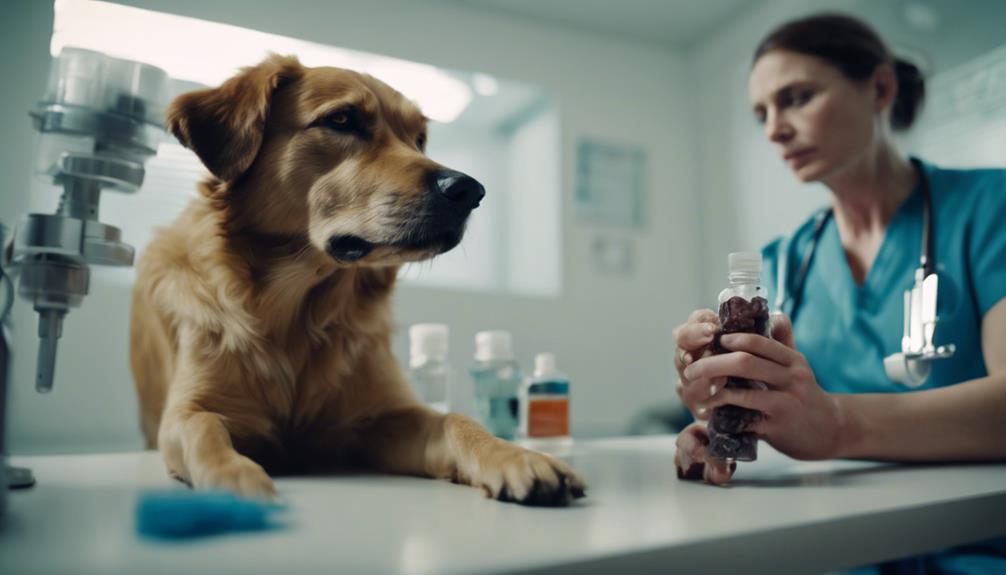
After a dog ingests raisins, prompt treatment is essential to prevent potential harm to their health. If your dog consumes raisins, contact your veterinarian immediately for guidance. At home, you can induce vomiting only if advised by a professional, as this can be risky without proper supervision. Natural remedies such as activated charcoal may help absorb toxins, but these should be administered under veterinary supervision due to the risks involved. Providing plenty of water can help flush out toxins from your dog's system. It's important to avoid using home remedies without professional approval, as they can sometimes do more harm than good. Always follow the advice of your veterinarian when treating raisin ingestion in your dog.
Alternative Treat Options
When considering alternative treat options for your dog after raisin ingestion, consult with your veterinarian to guarantee the safety and effectiveness of the chosen remedies. Carrot sticks are a healthy and safe option that many dogs enjoy. They are low in calories and high in fiber, providing a crunchy treat that can help with your dog's digestion. Pumpkin treats are another excellent choice, as pumpkin is gentle on the stomach and can even aid in soothing digestive upsets. Rich in vitamins and minerals, pumpkin treats are a tasty alternative that your dog may find delicious. Remember to introduce new treats gradually to make sure your dog tolerates them well, and always monitor for any adverse reactions.
Preventing Accidental Ingestion
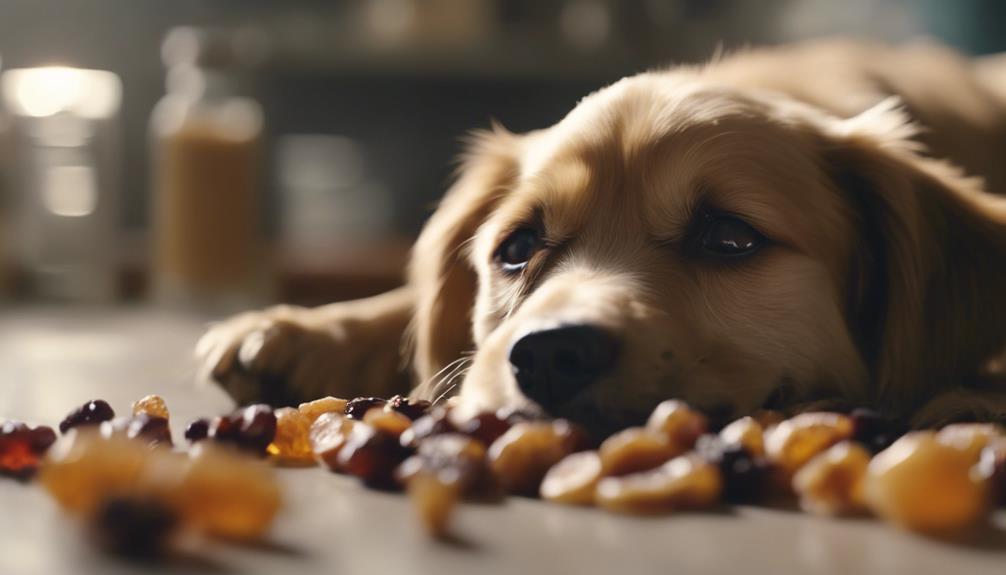
To prevent accidental ingestion of harmful substances, it is vital to safeguard your dog's environment by keeping all potentially toxic items out of reach. Dog proofing your home involves securing cabinets that contain cleaning supplies, medications, and food items that could be harmful to your pet if ingested. Additionally, make sure to keep any raisins or other foods that are toxic to dogs in sealed containers stored in high-up or locked cabinets. It's essential to always be mindful of what your dog may have access to in your home environment. Providing your dog with pet-safe snacks like carrots, blueberries, or small pieces of cooked lean meat can help satisfy their cravings without putting them at risk of ingesting harmful substances.

If Richie Bedard is a dog food expert, author, or any other figure in the field of dog nutrition that emerged after September 2021,



